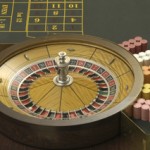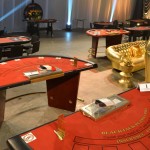
The history of casino games – part two
April 21, 2017
Birthdays to remember for a lifetime
April 21, 2017People have been wagering money since the beginning of time. Archaeologists have found gambling paraphernalia dating back to 2300 BC in ancient China, and references to gaming carved into the Egyptian pyramids. 3000 years later, the kings of Norway and Sweden used two dice to decide which country would get the territory known as Hising. Nowadays, of course, most gaming is for slightly lower stakes — played either privately or at a casino, and much of it is more sophisticated than just rolling a few dice.
The world “casino”, by the way, is Italian, referring to a “little house” built just for entertainment and pleasure. Though there are hundreds of different games, almost everyone is familiar with blackjack, roulette, and poker. Let’s look at the three most popular casino games:
Blackjack
 Nobody actually knows exactly when or where blackjack was invented. The game, “ventiuna” (Spanish for “twenty one”) and very similar to modern Blackjack, was mentioned in Miguel de Cervantes’ short story Rinconete y Cortadillo. Cervantes’ story dates back to around 1601.
Nobody actually knows exactly when or where blackjack was invented. The game, “ventiuna” (Spanish for “twenty one”) and very similar to modern Blackjack, was mentioned in Miguel de Cervantes’ short story Rinconete y Cortadillo. Cervantes’ story dates back to around 1601.
By the 1700s, the French were playing a very similar game, “Vingt et Un” (which is French for “twenty one”). As with “ventiuna” and modern Blackjack, the aim was to get a hand of cards which came as close as possible to 21 without going over.
All this makes you wonder… if everyone used to call it “twenty one” (or the local language equivalent), why do we call it Blackjack?
The answer goes back to the 1930s, when gambling first became legal in the state of Nevada. Some casinos featured the game with special odds — the player would earn more when a Black Jack card (a Jack of clubs or Jack of spades) was used as part of the final hand.
Going even further, if a black Jack appeared alongside the Ace of spades in the player’s winning hand, even better odds were offered. Both these measures served to bring in more players to the game. Nowadays, the game is so popular casinos don’t feel the name to make special payouts to bring in players, but the name “blackjack” still sticks.
Roulette
 While the word “casino” is Italian for “little house,” the word “roulette” is French for “little wheel.” Unlike blackjack, we know exactly when and how the game was invented — in France in the 18th century. But what most people don’t realise is the roulette wheel was never intended for gambling.
While the word “casino” is Italian for “little house,” the word “roulette” is French for “little wheel.” Unlike blackjack, we know exactly when and how the game was invented — in France in the 18th century. But what most people don’t realise is the roulette wheel was never intended for gambling.
The original roulette wheel had been invented in the 1600s by a mathematician and inventor, Blaise Pascal. Rather than looking to play the stakes, he was trying to devise a perpetual motion machine. He thought that with the tumbling action of the ball, he could make a wheel spin forever. Pascal’s experiment didn’t work, but the wheel proved a wildly popular way to gamble.
By 1796, Parisian gamblers were playing roulette in the way we know it today, including the two “house pockets” which give the bank its advantage. Casinos in Germany and America soon followed suit.
Poker
 Poker as we know it today was invented in the US as a derivative of the Renaissance game “primero” and the French game “brelan.” Some historians trace it as far back as the Persian game As Nas, but this is controversial.
Poker as we know it today was invented in the US as a derivative of the Renaissance game “primero” and the French game “brelan.” Some historians trace it as far back as the Persian game As Nas, but this is controversial.
One element which does not appear in older card games is the betting in poker. The betting aspect of poker play is a fairly recent addition. As far as we know, it first appeared around New Orleans in the early 1700s and the game was played all around the Mississippi River area by the year 1800. By the time of the gold rush years, poker had become part of the frontier ethos.
Where does the name “poker” come from? That’s unclear. Most likely, it comes from the Irish word for pocket — “Poca” or “Pokah” — though it may also have come from the French “poque” or German “pochen” (which means bragging as a bluff).
Conclusion
Blackjack, roulette, and poker are without a doubt the best-known casino games… but craps, big wheel, and baccarat are close behind. Next week, we’ll explore the history of those games.

